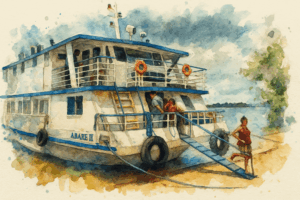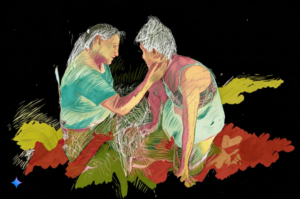A chance encounter between an American economist and a Brazilian medical student in 1987 sparked a humanitarian mission that has delivered over $1 billion in medical supplies to underserved communities worldwide.

In 1987, American economist Dr. James Jackson traveled to Brazil to help address the country’s devastating inflation. Working with a medical student translator named Lorena changed everything.

Lorena came from a family of healers who provided free medical care in Brazil’s favelas—slums so dangerous that police avoided them. When she invited Jackson to witness their work firsthand, he was deeply moved by the poverty he encountered. She led him into the favelas—Brazilian slums constructed from sheet metal and cardboard that even police avoided—where her family provided free medical services.
“As I looked around, I realized I was completely engulfed by abject poverty,” Jackson wrote in The Happiest Man in the World. “I felt a lump in my throat when I realized that these people had no one other than volunteer doctors to help them.”
Watching Lorena and her fiancé Dr. Paulo Velho make such significant impact with limited supplies, Jackson promised to send medical equipment back to Brazil. That promise became Project C.U.R.E.

Thirty-seven years later, the organization has delivered over $1 billion in medical supplies to more than 135 countries. The organization now addresses critical healthcare needs across multiple areas, from poverty-stricken regions where patients must bring their own medical supplies to hospitals, to emergency response in disaster zones and conflict areas. Their work particularly focuses on maternal and infant health, recognizing that childbirth remains a leading cause of death for women globally due to treatable conditions like hemorrhage and infection.
In March 2025, Jackson and Lorena Velho reunited at Project C.U.R.E.’s Denver headquarters, walking through warehouses filled with donated medical equipment destined for communities around the world. They reflected on their global impact from those humble beginnings in Brazilian favelas.
About Project C.U.R.E.
Project C.U.R.E. works to address the healthcare needs of people affected by poverty, disasters, and violence worldwide. The organization recognizes that at least 400 million people lack access to basic healthcare, with someone aged 30-70 dying every two seconds from preventable diseases. In many developing regions, limited access to medical identification, detection, and treatment creates life-threatening gaps in care.
The organization operates on multiple fronts: providing medical supplies to hospitals where patients often must bring their own equipment, supporting maternal and infant health programs, preparing healthcare systems for natural disasters, and responding to medical emergencies in conflict zones. Their work advances the United Nations Sustainable Development Goals, particularly Goal 3, which focuses on ensuring healthy lives and promoting well-being for all people.
This summary was based on the article: 37 Years Inspired—The Turning Point for the Happiest Man in the World, by Caroline Jackson
Related Articles

Bringing Healthcare to the Heart of the Amazon: Floating Clinics Saving Lives
Volunteer doctors navigate rivers on the Amazon in converted boats, bringing life-saving healthcare to isolated communities where the nearest hospital is eight hours away.

Silent Heroes of the Amazon: Traditional Midwives Face Climate Crisis
As climate change intensifies droughts in the Amazon rainforest, traditional midwives like Tabita dos Santos Moraes become lifelines for pregnant women in remote communities where once-navigable rivers have shrunk to impassable streams, making the journey to hospitals dangerous or impossible.

Vaccines for the World: Brazilian Scientists Push Boundaries in mRNA Vaccine Development
Patricia Neves and Ana Paula Ano Bom, researchers at Brazil’s Bio-Manguinhos Fiocruz Foundation, are spearheading an initiative to create accessible mRNA vaccines, aiming to address global health disparities and combat emerging diseases.
